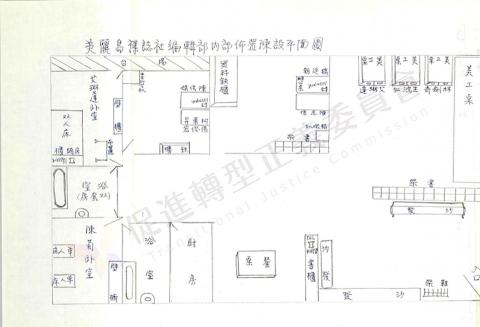Recently declassified National Security Bureau files showed that the former Chinese Nationalist Party (KMT) regime was keeping close tabs on Formosa Magazine and learned the entire content of its first issue before it went to print.
Formosa Magazine was at the center of 1979’s Kaohsiung Incident, also known as the Formosa Incident.
The magazine organized a pro-democracy demonstration on Dec. 10, 1979. It was intended to commemorate Human Rights Day.

Photo provided by the Transitional Justice Commission
The event turned violent when members of the crowd unknown to the organizers — and widely believed to have been provocateurs — began attacking police. The KMT authorities used the Incident as an excuse to arrest virtually all well-known opposition leaders.
Tuesday is the 40th anniversary of the Kaohsiung Incident.
The commission on Friday said that it has been in contact with the bureau since the Political Archives Act (政治檔案條例) was passed, in the hope of obtaining declassified files about the Incident.
The commission said that it worked closely with several agencies to facilitate the declassification and transfer of data about state-perpetrated injustice during the White Terror era.
At first it was not easy, as all files on the Kaohsiung Incident had been permanently classified, the commission said.
Thanks to assistance from the Presidential Office and National Security Council, the classified documents eventually saw the light of day, it said.
The data detailed how the then-KMT government surveilled Formosa Magazine from when it was founded to the publication of its first issue, the commission said, adding that the magazine was being so closely monitored that the KMT knew the entire content of its first issue before it went to print, including the layout of its inside pages.
In the few months of the short-lived magazine’s life, intelligence agencies had embedded informants in the magazine’s office to monitor every move, the commission said.
The declassified data also offered insight into the KMT’s decisionmaking process after the Kaohsiung Incident, including its choice to round up the activists and quash dissents, all of which was missing from previously released information, the commission said.
The information would shed new light on the Incident once it is made available to the public, it added.
The National Archives Administration in 2002 began collecting data on the Incident, and last year began its sixth wave of data collection, sourcing data from the National Security Bureau, the National Police Agency and the Investigation Bureau, the commission said.
A substantial portion of the most recent data showed that many non-governmental entities had been acting on the orders of intelligence agencies and feeding them information about the magazine, it said.

Taiwan is stepping up plans to create self-sufficient supply chains for combat drones and increase foreign orders from the US to counter China’s numerical superiority, a defense official said on Saturday. Commenting on condition of anonymity, the official said the nation’s armed forces are in agreement with US Admiral Samuel Paparo’s assessment that Taiwan’s military must be prepared to turn the nation’s waters into a “hellscape” for the Chinese People’s Liberation Army (PLA). Paparo, the commander of the US Indo-Pacific Command, reiterated the concept during a Congressional hearing in Washington on Wednesday. He first coined the term in a security conference last

Prosecutors today declined to say who was questioned regarding alleged forgery on petitions to recall Democratic Progressive Party (DPP) legislators, after Chinese-language media earlier reported that members of the Chinese Nationalist Party (KMT) Youth League were brought in for questioning. The Ministry of Justice Investigation Bureau confirmed that two people had been questioned, but did not disclose any further information about the ongoing investigation. KMT Youth League members Lee Hsiao-liang (李孝亮) and Liu Szu-yin (劉思吟) — who are leading the effort to recall DPP caucus chief executive Rosalia Wu (吳思瑤) and Legislator Wu Pei-yi (吳沛憶) — both posted on Facebook saying: “I

Sung Chien-liang (宋建樑), who led efforts to recall Democratic Progressive Party (DPP) Legislator Lee Kun-cheng (李坤城), was released on bail of NT$80,000 today amid outcry over his decision to wear a Nazi armband to questioning the night before. Sung arrived at the New Taipei District Prosecutors’ Office for questioning in a recall petition forgery case last night wearing a red armband bearing a swastika, carrying a copy of Adolf Hitler’s Mein Kampf and giving a Nazi salute. Sung left the building at 1:15am without the armband and covering the book with his coat. Lee said today that this is a serious

A mountain blaze that broke out yesterday morning in Yangmingshan National Park was put out after five hours, following multi agency efforts involving dozens of fire trucks and helicopter water drops. The fire might have been sparked by an air quality sensor operated by the National Center for High-Performance Computing, one of the national-level laboratories under the National Applied Research Laboratories, Yangmingshan National Park Headquarters said. The Taipei City Fire Department said the fire, which broke out at about 11am yesterday near the mountainous Xiaoyoukeng (小油坑) Recreation Area was extinguished at 4:32pm. It had initially dispatched 72 personnel in four command vehicles, 16